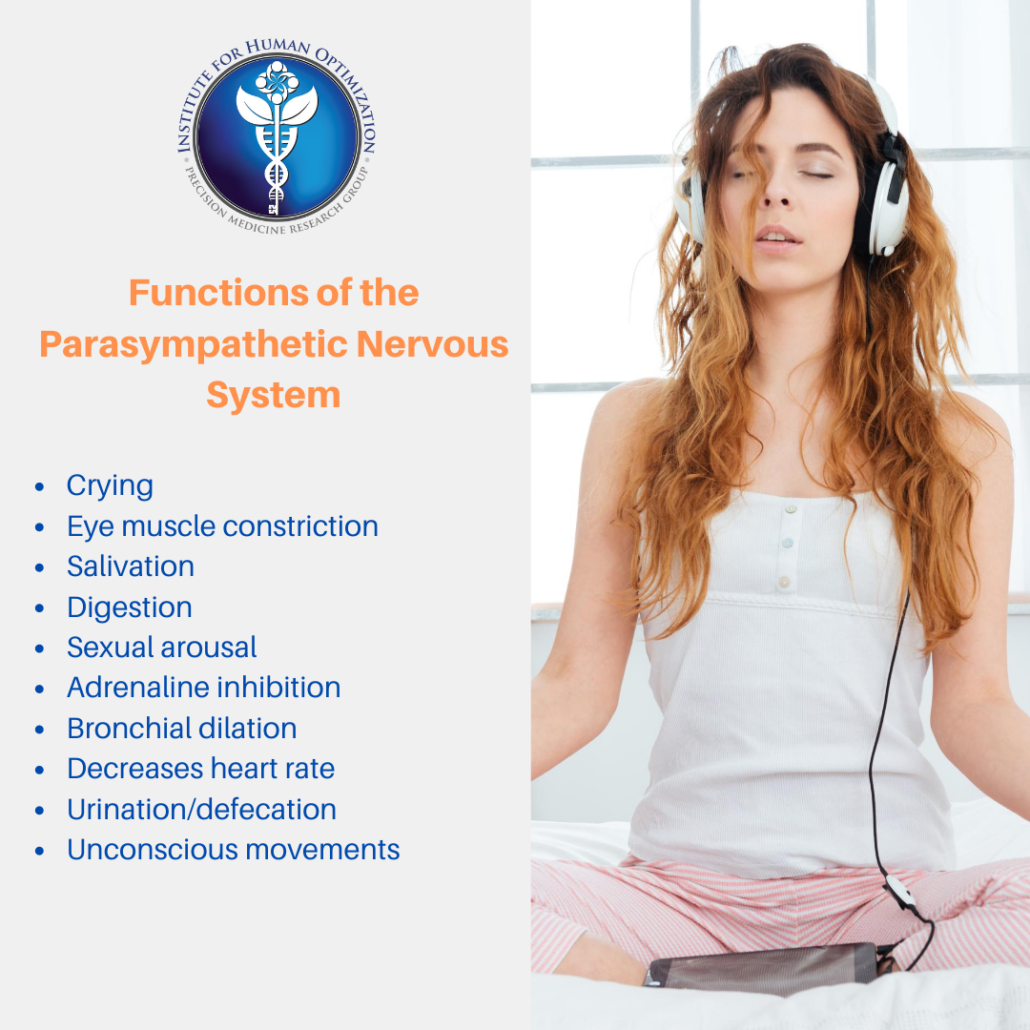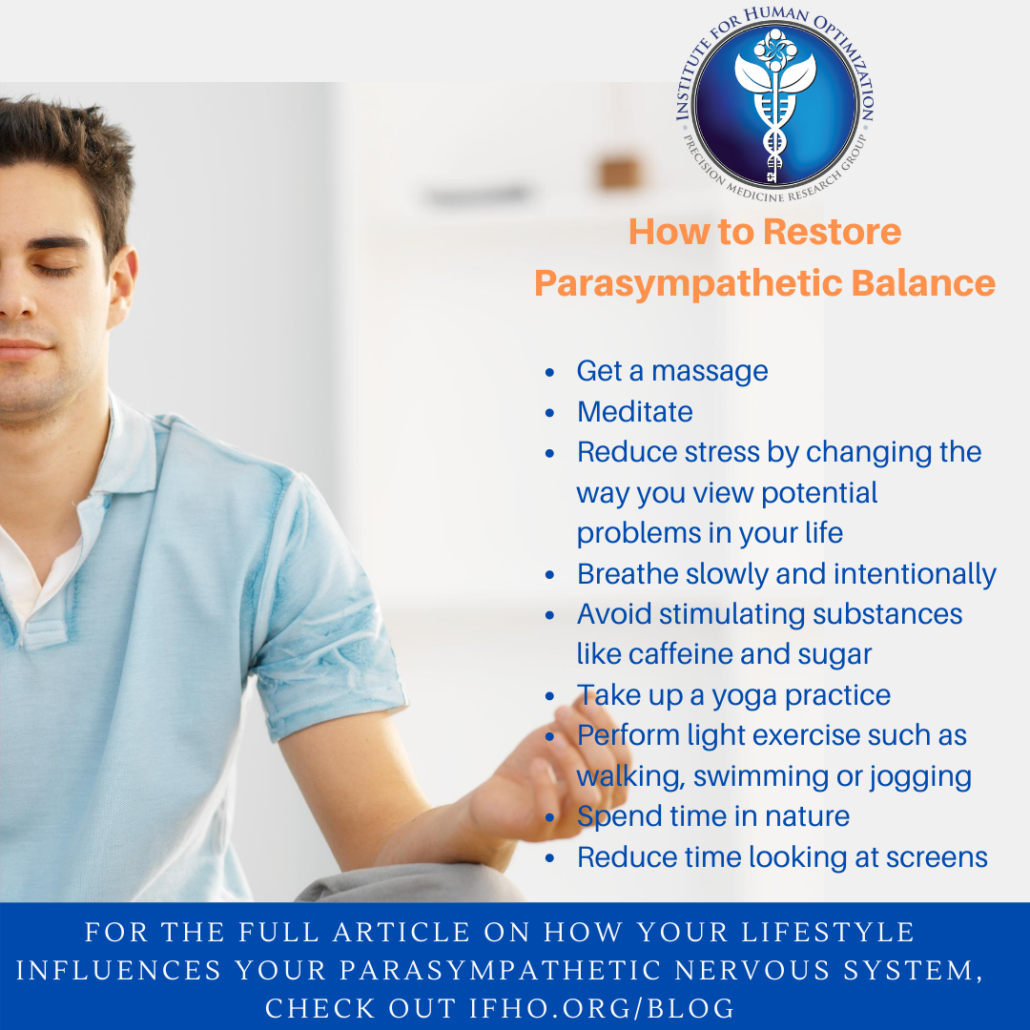Stimulating the Parasympathetic Nervous System: An Antidote to Stress
Inside all of us is a complicated system of structures that we don’t consciously control. Our nervous systems are our programming, using signals in the form of nerves, hormones, and a cocktail of biochemicals we have only just begun to explore. At the Institute for Human Optimization, we take a multi-faceted approach to healthcare that includes utilizing the parasympathetic nervous system as a means to improve the healthspan and mitigate potential future disease. In this week’s blog post, we cover the functions of the parasympathetic nervous system, how it relates to your health, how heart rate variability might be the key to monitoring your stress, and how what you can do to balance negative and positive stress in your life.
Paula is going on a first date. It’s been a few months, so she’s rightfully nervous. She arrives at the restaurant early and sits down, facing the door so she knows exactly when her date walks in.
Paula’s heart is beating at 100 beats per minute. Her palms are sweaty. Her eyes are dilated. This is because Paula’s body doesn’t understand the difference between being nervous for a date and being nervous because something might pop out of the jungle and kill you unexpectedly. Her sympathetic nervous system is activated- fight or flight. Her mind is signaling that it’s stressed and her body does what it does best, adjusts to deal with perceived danger.
PARASYMPATHETIC NERVOUS SYSTEM
Most modern humans don’t experience the same stressors as our ancient ancestors did. We don’t have saber-toothed tigers biting at our heels or starvation looming over our heads. But we do have the same systems for dealing with those problems, and our bodies still rely on them to keep us healthy and safe.
In the old days, you escaped the tiger, the danger was averted, and the stress is gone. Today we carry the stress of work, the news, social media, and all the millions of things we have to do on our shoulders most of the day. This keeps us in a constant state of “fight or flight” and can cause health problems if not addressed.

On her date, Paula’s sympathetic nervous system is activated. Stress hormones such as cortisol and adrenaline spike to prepare her to deal with whatever’s coming. If she was perpetually stressed this way, and her cortisol levels remained high, Paula would be statistically more likely to experience cardiovascular disorders such as strokes or heart attacks.
This chronic wear and tear on the body due to chronic stress is known as allostatic load. Striking a balance between positive and negative stressors through lifestyle and behavioral changes is called allostasis. Studies show that while chronic stress is detrimental to many body systems, short-term stress (like when exercising vigorously, fasting, or sitting in a sauna) has been shown to boost the immune system and create resilience.
The parasympathetic nervous system is activated in times of resting and digesting. It involves nerves, glands, organs, and muscles that work together to control the parts of your biology you don’t have time to regulate manually. Just think about how impossible it would be to mentally control your digestion, heart rate, hormone production, tears, saliva, sexual arousal, urination, and defecation all consciously.
Thankfully, Paula doesn’t have to. She goes to the bathroom before her date arrives and everything happens just as it should without her having to put in any effort at all.
Heart Rate Variability
Doctors, biohackers, and researchers have been studying new ways to see what’s really happening in their patient’s bodies. One interesting field of study is the correlation between heart rate variability (HRV) and health.
HRV is, simply put, the amount of time between heartbeats. Reduced HRV is associated with the development of numerous conditions, for example, diabetes, cardiovascular disease, inflammation, obesity, and psychiatric disorders. The company HeartMath currently offers technology that monitors your HRV so that you can see the difference in when you’re stressing about things and when you’re meditating or spending time doing something you enjoy. Our mental states influence our body states.
If we were to look at Paula’s HRV at the beginning of the night, we would notice a chaotic rhythm as her heart rate spikes and drops in reaction to her perceived stressors.
But as the night goes on, the date begins to go well. Paula starts to feel comfortable, enjoying the conversation and meal they share. If we were to measure her HRV at this point, we would see a more even, stable pattern as the parasympathetic nervous system kicks in to slow the heart rate and begin digesting the dinner she just devoured.
Ways to Assist Your Parasympathetic Nervous System

At the Institute for Human Optimization, we take your mental health into consideration when dissing any healthcare treatments or lifestyle adjustments. We understand the implications of parasympathetic nervous system health and your ability to regulate your thoughts, and find allostasis in this modern world.
Exercise is an activity that causes short-term stress that has an overall benefit on the body. It stimulates the sympathetic nervous system for a short time and then allows you to slide more easily into a parasympathetic state afterward. This is the mechanism responsible for what some call a “runners high”. Endorphins are released after you accomplish something physically difficult that make you feel good and able to rest.
When we are constantly bombarded by projects and situations that stress us out but are never truly resolved, our “fight or flight” systems never shut down, our “rest and digest” systems never come online, and we suffer health consequences in the long run.
We encourage our patients to take the time to relax and unwind, meditate, stretch, and exercise in a way that contributes to their allostatic load in a positive way. Stress is a part of life, but its health effects can be mitigated by understanding and hacking the parasympathetic nervous system.
The mind state affects the body state.
If you’re ready to get a comprehensive overlook of your health and discuss how we can help you reach your goals, schedule a free discovery call here.





Leave a Reply
Want to join the discussion?Feel free to contribute!